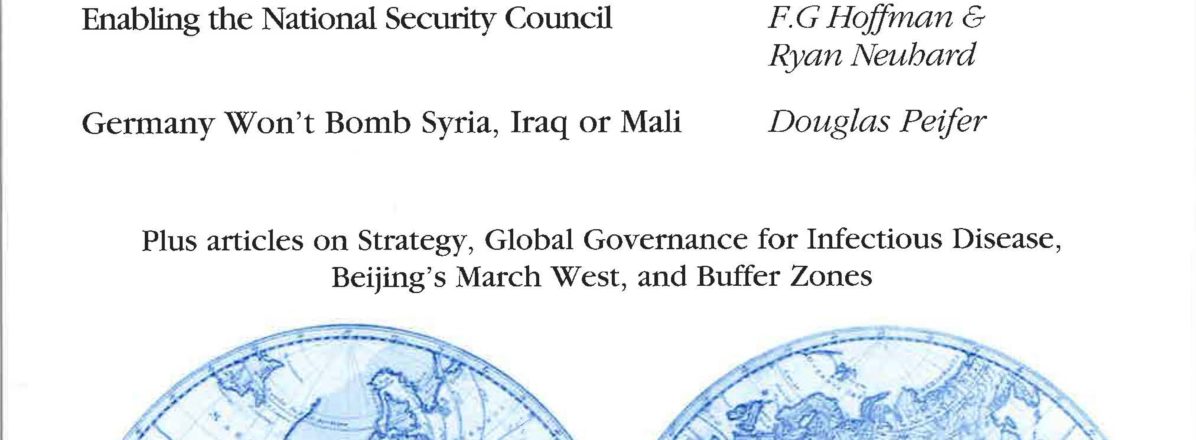A nation must think before it acts.
Presenting the Spring 2016 Orbis: FPRI’s Journal of World Affairs
 Mac Owens is Editor of Orbis: FPRI’s Journal of World Affairs, and Senior Fellow in our Program on National Security. Orbis is published for the Foreign Policy Research Institute by Elsevier. For subscription or other information, visit the Elsevier website. FPRI members at the $150 level or above receive a complimentary subscription (for individuals, not institutions). For membership information, please click here. To view this issue online, please click here.
Mac Owens is Editor of Orbis: FPRI’s Journal of World Affairs, and Senior Fellow in our Program on National Security. Orbis is published for the Foreign Policy Research Institute by Elsevier. For subscription or other information, visit the Elsevier website. FPRI members at the $150 level or above receive a complimentary subscription (for individuals, not institutions). For membership information, please click here. To view this issue online, please click here.
Philadelphia, PA — Welcome to the spring 2016 issue of Orbis: FPRI’s Journal of World Affairs. We begin with Arthur Waldron’s take on potential threats to global stability. He uses the analogy of heating milk on a gas stove only to have it boil over disastrously. In fact, he argues that the United States and its allies face at least four major and converging challenges that may also boil over like overheated milk, perhaps simultaneously. The great danger is that if they do, the United States may not be able to respond adequately.
In a very important article, Paul Bracken offers an unconventional look at cyber threat. While most analysts view the cyber threat in the context of terrorism, infrastructure attacks, and as a preparation for a kinetic attack, Bracken examines the impact of cyber technologies on deterrence and arms race stability, especially the impact of big data analytics, computer vision, UAVs and precision strike on the ability to locate mobile missiles. As he notes, the implications of this trend vary from region to region, but they will shape major power nuclear modernization, crisis stability among secondary powers, and conventional attack on nuclear systems.
Adam Garfinkle argues that there is no “modern” Middle East except as a shorthand meaning of “new” or “recent.” In terms of political sociology, the states of the Middle East are not “modern.” Instead they are hybrid entities shaped by Arab tribal social structure and Islamic concepts of social and political order on the one hand and often alien Western ideas on the other. This situation is the result of a process that took 53 years, beginning with the dismemberment of the Ottoman Empire at the end of World War I in 1918 and continuing until the United Arab Emirates became the last colonial domain to gain independence in 1971.
Frank Hoffman and Ryan Neuhard contend that the next administration will should take a close look at the last 15 years of strategic performance with an eye toward improving national security decision making at the strategic level. The authors examine proposals to enhance the quality of policy making and implementation oversight mechanisms at the National Security Council and recommend the creation of an inter-agency community of national security professionals as well as other ways to improve interagency planning.
Paul D. Miller begins his contribution to the spring issue by asking: what is “grand” strategy? He contends that the utility of the concept is undermined when it is conceived as an all-encompassing idea for coordinating the resources of an entire nation to achieve its ultimate goals. This definition, he argues, is unachievable and more importantly, it blurs the lines between strategy and policy. Instead, he suggests that grand strategy is best thought of as both the intellectual framework, or master concept that ties together whole-of-government (but not whole-of-nation) planning, and the long-term pattern of behavior that reveals states’ behaviors and priorities in action.
Lionel Beehner and Gustav Meibauer examine the concept of “buffer zones” and their role in international conflict management, third-party intervention and power politics. Douglas Peifer argues that despite the claim that Germany has set aside its reservations regarding the utility of force in the wake of the Paris terrorist attack in 2015, the fact remains that Germany—because of its strategic culture that stems from the experience of World War II—continues to draw a red line when it comes to the employment of coercive airpower and direct combat operations
Harvey Rubin and Nicholas Saidel examine an element of what has come to be called “human security.” Looking at the 2014 Ebola crisis, among others, they focus on the institutional defects and gaps in the international regime managing global infectious disease control.
Finally, Michael Clarke analyzes Chinese President Xi Jinping’s “One Belt, One Road” strategy, arguing that this strategy has been given impetus by the shifting geopolitical landscape in Central Asia resulting from the U.S. withdrawal from Afghanistan, Russia’s relative decline, and Beijing’s quest for stability in its restive province of Xinjiang. Thus, China’s Eurasian frontiers have emerged as a major factor in Beijing’s foreign policy.
Finally, Nick Danforth reviews Aliza Marcus’ Blood and Belief: The PKK and the Kurdish Fight for Independence, and Adrian Basora reviews Democratic Transitions: Conversations with World Leaders, edited by Sergio Bitar & Abraham F. Lowenthal.




